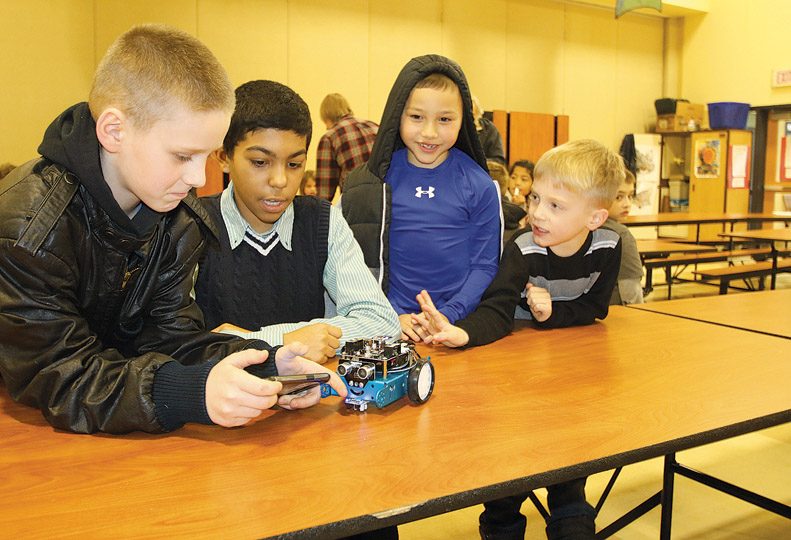
Home » Connecting on STEM
Connecting on STEM
Concepts now introduced as early as kindergarten

April 7, 2016
Spokane-area educators and business leaders say they’re gaining more traction as they create more STEM—science, technology, engineering, and math—opportunities for students as young as kindergarten age.
Lisa White, director of Spokane Public Schools’ afterschool programs, says the district recently met its goal set roughly two years ago to establish robotics clubs in all 34 elementary schools in Spokane.
“We want to attain high levels of math and science for all students with a collegiate-level focus,” White says. Regionally, she says, STEM-related careers are going to require at least a bachelor’s degree or higher.
“The focus for students ranging from kindergarten to third grade is to introduce them to the basic concepts of coding,” White says. “We want to train them to begin to think about becoming producers of technology and not just consumers of it. We’re saying, ‘Make your own game.’ This is practical for what we need in our community.”
Two years ago, Greater Spokane Incorporated began leading the day-to-day operations of Spokane STEM, a nonprofit organization that works to advance science, technology, engineering, and math learning and innovation among youth.
Alisha Benson, vice president of education and workforce for GSI, also serves as the Spokane STEM network executive director. GSI also is partnering with Spokane-based NorthEast Washington Education Service District 101 in the development of STEM offerings.
Spokane STEM seeks to increase enrollment in STEM programs at regional universities and colleges by expanding the number of students completing degrees and specialized certifications. It’s estimated that by 2018 70 percent of jobs in STEM fields will require at least a bachelor’s degree.
“That’s the current workforce need,” Benson says. “As a business organization, we’ve got to play a role in building the workforce pipeline.”
Nationally, the U.S. Bureau of Labor Statistics (BLS) says STEM-related occupations will grow to more than 9 million between now and 2022. The Washington, D.C.-based STEM Education Coalition was created to inform federal and state policymakers on the important role that STEM plays in U.S. competitiveness and future economic prosperity.
Almost 30 percent of the fastest-growing occupations in the next decade will require at least some background in STEM area fields, says BLS.
Benson says GSI serves as a bridge between local businesses and Spokane County educators, bringing the two groups together. It gives the business community a chance to observe learning in classroom settings while giving students and teachers an opportunity to have access to daily work environments.
Two STEM programs that GSI sponsors, Business after School and Teaching the Teachers, have played a role in helping facilitate the relationship between local businesses and educators, she says.
“The real world is not just taking a test,” Benson says. “At work, failure the first, second, or third time is often the norm. Students especially need to see this.”
Benson says teachers are then able to adapt classroom environments in a fashion that more closely resembles a business environment. She thinks GSI has helped bring the education and business sectors together.
“We’ve supported education policies and have backed all the school districts in support of K-12 bonds and levies,” Benson says.
Every school district and higher education institution in Spokane County is affiliated with the STEM network in some capacity, she says.
Pat Lynch, energy solutions director at Avista Corp., says the Spokane-based utility company is closely affiliated with STEM.
“We’re a STEM employer, so it just makes good sense from our point of view to play an active role in the community,” Lynch says. “What has developed in recent years is a focused approach to growing and creating opportunities for young workers, and potential workers, in STEM-related fields. I believe, as a community, we are doing a strong job of attracting and engaging more students.”
Lynch says a strong Spokane STEM organization will only enhance future economic growth in the region. Avista, with roughly 1,600 employees across the Inland Northwest, has an active summer internship program for college students.
For current employees, Avista provides tuition assistance of up to $5,250 each year for undergraduate and master’s level studies in programs that add to employees’ performance and effectiveness in present or foreseeable jobs within the company, he says.
Lynch, also president of the utility company’s foundation, says the foundation contributed $500,000 to education programs and scholarships in 2014.
Last week, White and her staff began publicizing Spokane Public Schools’ 2016 summer STEM camps for students in kindergarten through eighth grade.
This will be the third year the district has hosted the camp.
Robotics, computer design and programming are some of the courses scheduled to be offered. STEM camp is not limited to students in the Spokane School District.
Four weeks of camps are offered July 11-14, July 18-21, July 25-28 and Aug. 1-4. Camp fees are $80 per week, and students can attend one to all four sessions.
Camp times run from 8 a.m. to 1 p.m., with camp locations at Garry Middle School, at 725 E. Joseph in North Spokane, and Sacajawea Middle School, at 401 E. 33rd on the South Hill.
“We want to continue to build on the pieces our workforce partners want,” White says. “It’s practical for what we need in our community.”
Latest News Up Close Education & Talent
Related Articles



![Brad head shot[1] web](https://www.spokanejournal.com/ext/resources/2025/03/10/thumb/Brad-Head-Shot[1]_web.jpg?1741642753)
